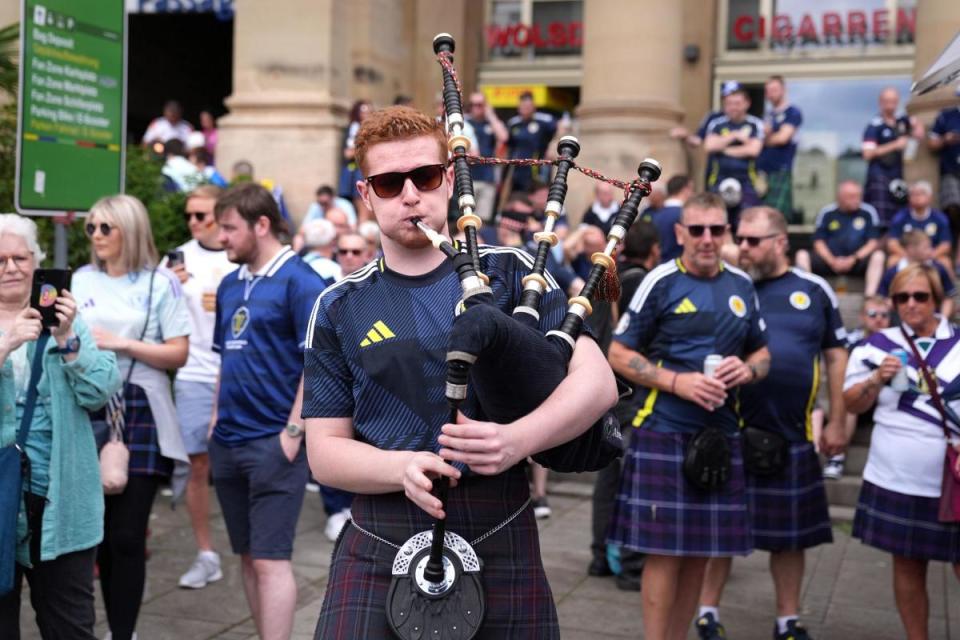'A romantic notion': The century-year-old reason why Germany loves Scotland

THE party may be over for the Tartan Army with Scotland being emphatically dumped out of the Euros, but the travelling fans have been the real success story winning the hearts of thousands of Germans.
Days before the tournament started a reported 200,000 Scotland fans descended on Munich in anticipation of the opening game against the tournament hosts.
Headlines across Germany piled on praise for the Tartan Army who brought a party atmosphere to a more than welcoming host nation.
“Dear Scots: We love you,” wrote the Cologne-based daily paper Kolnische Rundschau and even the police thanked fans for creating a “special atmosphere”.
READ MORE: Tartan Army flocks to Stuttgart ahead of crucial Euros match against Hungary
The Tartan Army have gone down so well it was voted the best fanbase at this year's Euros and there is even a petition for an annual Scotland v Germany game.
The relationship between the Germans and the Scottish is not a modern love story, but rather one that stems from the 18th century, according to one language expert.
Billy Kay, broadcaster and language activist, said the Germans have romanticised Scottish culture for decades as they were fascinated with the idea of the “noble savage”.
Kay explains Germans believed the Scottish personified a primeval person who were in tune with the environment, the mountains, with poetry and with their own feelings.
German academics used to visit Scotland and tour the Highlands and when they returned home, they would “wax lyrical” about the beautiful romantic landscape and the mythology around Scots.
The Highlands (Image: NQ)
Kay reckons that the Scotland fans turning up in their thousands all dressed in kilts and with bagpipes in hand tapped into the century-old mythology.
He was in Germany with thousands of other Scotland fans and joined an organised walk, led by 20 pipers, to one of the games which he said felt like marching with a liberating army.
He said: “I think we turn up in our kilts and play our bagpipes, and it kind of ties in with a romantic notion that they've already got planted in their in their culture.”
“I was at the I was at the fan march out to the stadium (in Cologne) on Wednesday,” he added.
“It was amazing.
“It reminded me of being part of almost like an army of liberation.
“Going through the streets of a city that had just been liberated.
“I mean, literally people were hanging out the windows, waving Scottish flags, and people were waving and sending us kisses and giving us bottles of beer.
“It was just a really a party atmosphere.”
Alison Phipps, who is a professor of languages and intercultural studies, echoed Kay’s points around German's romanticism of Scots.
One key text that acts as a key cultural touchstone for Germans to Scotland is Macbeth.
The Shakespeare classic is taught in the school curriculum and its translation is hugely accessible to Germans according to Phipps and has been a real contributing factor to tourism in Scotland.
She stated that German tourists even today still have a profound connection with the Scottish landscape and its culture thanks to the classic play.
Her studies also found that Germans like countries that are “nations but not nations”.
READ MORE: The Scottish diaspora and their role in making of modern Germany
She said Germany have long worked to undermine its own sense of nationhood because it has had such a terrible relationship with nationalism and that it likes what it sees within Scotland, the idea of a nation that isn't a nation.
She said: “There is a genuine, real belief, in this cultural imaginary of the nation-state that isn't a nation-state.
“Particularly when you combine that with this Tartan Army which is behaving responsibly.
“If you think about the appalling way in which the German army behaved during the Second World War.
“Then if you think you've got an army here from a country that you've already got on a pedestal that is in this mythic, imaginary, then you've got an army who are welcome.
“Because of these ideals of distant misty landscapes.”
She added: “In a way, there is this like over the top positive response to Scotland.
“But it is part of this really quite complicated construction of a national identity.”
Colin Macpherson who lives in Straubing, in Lower Bavaria, reaffirms both Philpps’ and Kay’s sentiment that Germans have a “soft spot” for Scottish culture and that the travelling fans were able to tap into the growing anticipation for their own national festivities.
(Image: Andrew Milligan/PA Wire)
He also made the point that some of Scotland's biggest popular exports are loved by the Germans, citing Runrig as an example and that you would be “excused for thinking everyone was fluent in Gaelic” with how well they know all the lyrics.
The reputation of the Tartan Army has not let itself down according to Macpherson who said the party atmosphere is something the Germans might not be known for but is something they enjoy.
He said: “In Bavaria of course there is also a common heritage through the Celts.
“Obviously the Tartan Army’s positive reputation leads the way in a major football tournament.
“Thousands of fans partying and having a good time is not something seen every day in German cities, and the locals are quickly infected by the positive vibes.
“Equally, especially in Bavaria, with the summer beer festivals coming up, maybe it’s just that the locals feel pleasant anticipation of what’s to come.
“In spite of their dour reputation Germans also like to have a party and know one when they see one.”

 Yahoo Sport
Yahoo Sport 







































